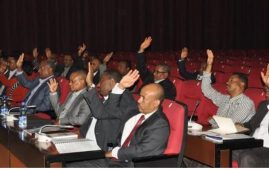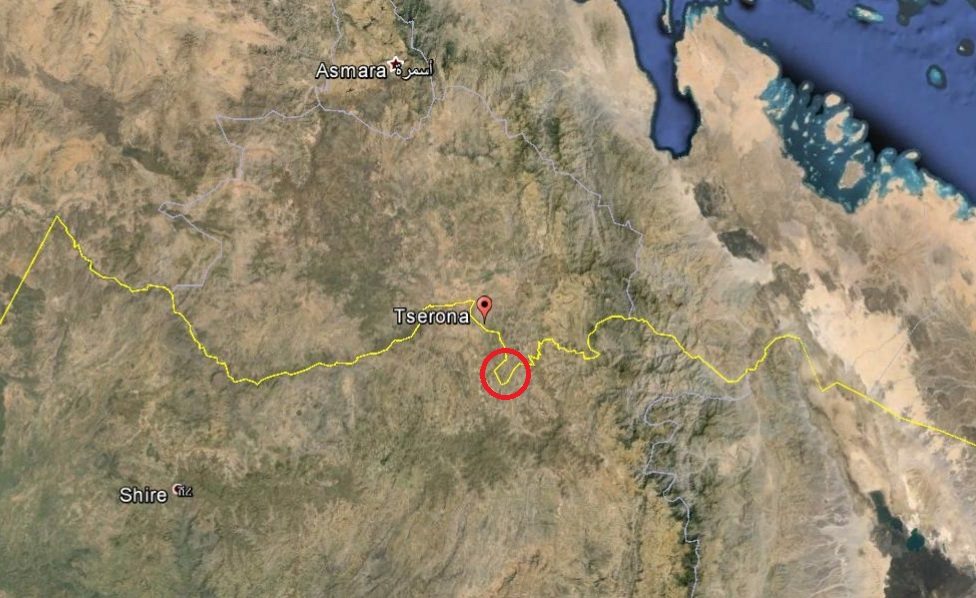[From: A Week in the Horn of Africa – Nov. 25, 2011 issue]
Today’s Extraordinary Summit of IGAD Heads of State and Government, chaired by Prime Minister Meles, the current chair of IGAD, was attended by President Ismail Omar Guelleh of Djibouti, President Mwai Kibaki of Kenya and President Sheikh Sharif of Somalia. Also present were the State Minister of Foreign Affairs of Sudan, South Sudan’s Minister of Commerce, Industry and Investment and the Minister of Defence of Uganda as well as the Engineer Mahboub Maalim, IGAD’s Executive Secretary, Ambassador Ramtane Lamamra, the AU Commissioner for Peace and Security, the AU’s High Representative for Somalia, Jerry Rawlings, and the Special Representative of the Chairperson of the AU Commission for Somalia, Boubacar Diarra. South Sudan was admitted to the regional bloc during the meeting.
The Summit discussed the current political and security situation in Somalia and the AU brief on the implementation of the outstanding issues of the Sudan Comprehensive Peace Agreement. It heard from President Sheikh Sharif on the situation in Somalia and was briefed by President Kibaki on Kenya’s security operations in pursuit of Al-Shabaab as well as by Commissioner Lamamra and Jerry Rawlings. It took note of the gains made by TFG forces, by AMISOM and by the Kenyan Defence Forces (KDF) and considered the decisions of the Ministers of Defence and Chiefs of Defence Staffs of troops contributing countries in consultative meetings during the last three months. The Summit therefore welcomed the joint security operations of the Kenyan Defence Forces and the TFG forces, and said it understood, appreciated and supported the joint operation as a unique opportunity to consolidate the gains made. It emphasized the need for regional consolidation and enhanced coordination between AMISOM, the TFG and KDF. It stressed the need for enhanced engagement by IGAD and the AU to galvanize international support for the ongoing operations. It also called on the Ethiopian government to continue to support the Kenyan, TFG, AMISOM operation, and for Kenya to consider the prospects of integrating its forces in AMISOM.
The Summit communiqué paid tribute to the TFG forces, to AMISOM and the troop contributing countries for their continued sacrifices. It urged that an audit of threats to Mogadishu and the requirements needed to deal with these should be carried out in order to assess appropriate deployment to all liberated areas. It urged the TFG to take advantage of the expanded liberated areas to foster security and enhance reconciliation. It reiterated IGAD’s commitment to continue to support the Djibouti Peace Process, the Kampala Accord and the Roadmap. It welcomed Djibouti’s decision to provide troops for AMISOM by the end of the year and called on other countries to fulfil their pledges urgently to enable AMISOM to consolidate security beyond Mogadishu.
It also called on the UN Security Council to enhance the mandate of AMISOM and authorize strengthening it to a level appropriate for the consolidation of peace and security in Somalia. It directed the chairperson of the Council of Ministers to make arrangement to ensure continuous consultations of IGAD Chiefs of Defence Staffs and military experts on how to support the process of coordination on the ground, and reiterated the need to sustain support to the TFG security forces and AMISOM to secure safe corridors for humanitarian assistance.
On Sudanese issues, the Summit strongly urged the Governments of Sudan and South Sudan to urgently resume negotiations and expedite implementation of outstanding issues of the CPA, and commended Ethiopia’s role in providing peacekeeping force in Abyei. It demanded the Government of Eritrea release all Djiboutian prisoners of war, and condemned the Government of Eritrea for its continuing supply of ammunitions to extremist groups, particularly Al-Shabaab.
In advance of the Summit yesterday, Prime Minister Meles held talks with President Sheikh Sharif of Somalia after he arrived in Addis Ababa. The Prime Minister underlined that Ethiopia would strengthen its support to the TFG and would work closely with the TFG to eliminate Al-Shabaab.
There was a lot of speculation last weekend that Ethiopia would be sending troops to Somalia again and indeed that Ethiopian troops had already entered Somalia and claims that troops had been seen crossing the border. The Ethiopian government, however, made it quite clear that the reports last weekend that Ethiopian forces had crossed into parts of Somalia along their common border was “absolutely not true”. There were no Ethiopian troops inside Somalia and although there has been speculation that Ethiopia might send troops to Somalia, the Ministry of Foreign Affairs has emphasized that no decision could be made in advance of the IGAD Summit. A TFG spokesman also denied that any Ethiopian troops were inside Somalia, though Defence Minister, Hussein Arab Issa, said the TFG would welcome anyone who will help fight against Al-Shabaab. At the same time, Ethiopia’s Deputy Prime Minister and Foreign Minister, Ato Hailemariam Desalegn, said on Wednesday that Ethiopia would be prepared to further strengthen its ongoing all-rounded support to Somalia through IGAD.
Meanwhile, Kenyan forces continued their operations in Lower Juba, with planes and warships in action at the weekend to assist TFG forces destroying two Al-Shabaab training camps at Hola Wajeer in Badade District of Lower Juba. Kenya’s military spokesman said the two camps were also used by Al Qaeda and to accommodate foreign fighters. Colonel Oguna of the Kenyan Defence Ministry said that the Kenyan forces were benefitting substantially from information and intelligence being provided by people liberated from Al-Shabaab control.
Former President Rawlings, the AU Special Envoy for Somalia suggested this week that the TFG and others involved in the struggle against Al-Shabaab should be prepared to negotiate with “combatant elements who would want to put aside their weapons and talk politics.” At a press conference in Nairobi he suggested that “an opening for them to come on board politically” should be created. TFG Prime Minister, Dr. Abdiweli Mohamed Ali said in September that the government was open to talks with Al-Shabaab commanders, and that informal talks had been held. The AU Special Envoy said every effort should be made to reduce the number of civilian casualties and to reach out to the political leadership to harmonize the developing peace situation with political ambitions.
The UN’s Food Security and Nutrition Analysis Unit has said that famine no longer exists in three of the worst-affected areas of Somalia following the intervention of aid agencies. Bay, Bakool and Lower Shebelle are no longer classified as famine zones, but a quarter of a million people still face immanent starvation. The three areas of Middle Shebelle, Afgoye and the Mogadishu camps for displaced people are still considered to be suffering from famine. Although the rains have come, Mark Bowden, the UN Humanitarian Affairs Coordinator, still sees Somalia as the most critical situation in the world even though there have been some reductions in rates of malnutrition and of mortality. The head of the UN’s Food and Agricultural Organization office in Somalia says this is just the beginning of a phase of potential recovery “if everything goes well”. It is likely to be a year before anyone can be sure that the danger from famine has passed.
****************
Check the Somalia archive, the Kenya archive, and the Eritrea archive for related posts.





